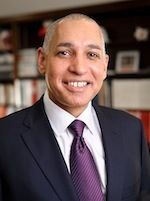Committee offers recommendations on new budget model
A committee reviewing the University of Wisconsin–Madison’s internal budget process is recommending a new model that would establish transparent, objective metrics to drive resource allocation decisions in the areas of instruction and research.
The Budget Model Development Committee met through the summer to build upon the recommendations of the Budget Model Review Committee, which were released in February. The review committee — which, like the development committee, was made up of faculty and staff from across campus, and a student representative — concluded that the current budget model no longer meets the campus’s needs and that it’s time for a change.
Campus forums to gather input on the recommendations for a new budget model are set to begin at 10 a.m. on Thursday, Oct. 30 at Union South in Varsity Hall. A second forum will be held from 1-2:30 p.m. Monday, Nov. 3, in 1306 Health Sciences Learning Center. The forums will be part of an extensive discussion with campus stakeholders about the proposed model.
The process is considering the distribution of resources to the schools and colleges. Deans would retain all authority to decide departmental allocations. A gradual shift to the new model would be expected to take several years.

Rebecca Blank
“I applaud the work of the committees on this important topic, and look forward to a robust campus discussion on the recommendations,” Chancellor Rebecca Blank says. “The importance of responsible resource stewardship has never been more apparent in the history of UW–Madison.”
Terry Warfield, chair of the Department of Accounting and Information Systems in the Wisconsin School of Business, has served on both committees and lauded the collaborative approach they took.

Terry Warfield
“Similar to the work of the predecessor Budget Model Review Committee, this committee operated in the best spirit of shared governance, working collaboratively to develop a proposed budget model that will support strategic decision-making in service to the shared instructional and research missions of the campus,” Warfield says.
UW–Madison has used the same approach to budgeting since the UW System merger in 1972-73. That approach has been based primarily upon allocating dollars to schools and colleges according to the amount they received in the previous budget, regardless of whether the degree of need had changed.
Declining financial support from the state, along with innovation in educational and research programs, are among that factors that have led to the reevaluation of the university’s budget practices, Vice Chancellor for Finance and Administration Darrell Bazzell says.

Darrell Bazzell
“We are in a time of dramatic changes in the way higher education is funded in this country, and UW–Madison is not alone in feeling the impact of these shifts,” says Bazzell, who chaired both the review and development committees. “To remain a leader in instruction and research, we must have the ability to be more nimble in our budget practices.”
The Budget Model Development Committee met throughout the spring and summer. After extensive review of the existing model and examination of models at peer institutions, the committee reached consensus on a new model for UW–Madison.
For instructional activity, the committee recommends using objective metrics to allow resources to shift based on credit hours taught and degree majors. For research, funds should be distributed based on sponsored research expenditures and associated overhead, the committee recommends.
The committee also recommends that the new model have the flexibility to generate resources to be used at the discretion of campus leadership to invest in strategic initiatives or address important campus needs.
“The importance of responsible resource stewardship has never been more apparent in the history of UW–Madison.”
Rebecca Blank
Program revenue-based instruction programs and summer session courses should not be part of the new allocation process, the committee recommends, but those areas should be evaluated in the future. In addition, the committee recommends that professional programs should continue to be managed through a separate process.




